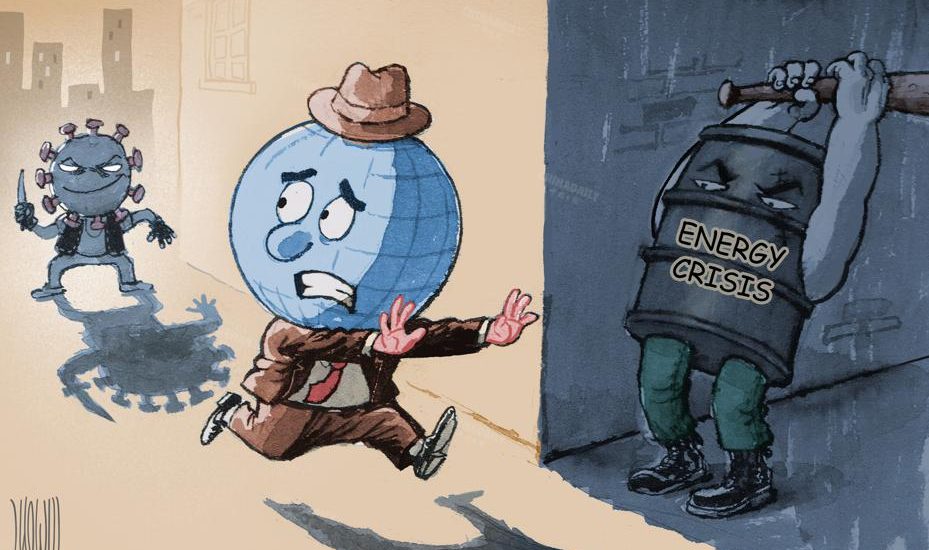ENERGY CRISIS, HERE WE GO AGAINBY Antonio Picasso
- 22 March 2022
- Posted by: Competere
- Category: Senza categoria

The Russian-Ukrainian war confirms the West’s vain attempts to break down failing economic and geopolitical paradigms. If neoliberal capitalism wishes to survive, it must make a tremendous effort, from an economic, political and financial point of view, while taking advantage of the technological innovation capital that it owns.
SAD DEJÀ-VU
The current energy and commodity emergency is recurring nightmare. A producer country undergoing a crisis, Western transformation industries realizing how dependent they are on that umbilical cord, price spikes, market frenzies, consumer panic, buffer government measures, then the crisis subdues, and all goes back to normal. We have all seen this movie already. Especially the bit on strategic mistakes, lacking structural reforms, lack of long-term vision. There is little reason to believe that the Russian-Ukrainian war will play out any different. The pandemic was supposed to teach us something about global supply chains, and yet neither American nor EU recovery plans have laid down a plan to free ourselves from supply monopolies and to create a truly global and sustainable network of resource-rich and manufacturing-intense countries.
Economics may very well be a sad science, but it allows for simulations and for imagining a better world. So, leaving behind the conviction that not even a war in our literal back garden would get through to us, let us suppose what alternatives there exist to avoid neoliberal capitalism to fall in well-known traps.
A NEW COLONIALISM? NO, THANKS
The first option is a return of the West to imperialism. With the armed forces at the West’s (or rather at America’s) disposal, few governments in Asia, Africa and South American would be able to counter the rebirth of the British Raj, this time under the guidance of a benevolent empire. A couple of wars, quicker than the one Putin has started, would do for the resurgence of full colonialism. What stands in our way? Guilt. Not only have we cause sufficient damage in the past, but the math would not add up anyway. Colonial empires were brought down in the mid-twentieth century because the heartlands could not sustain their costs. If we couldn’t then, we definitely couldn’t now.
360 OPERATION
Plan B, obviously the only feasible one, requires a series of concentric operations.
At the political level, we must define our goal: do we want to keep doing business with the various Saddams, Gadhafis, and Putins? Only to later realize they are Saddam, Gadhafi and Putin! The cases of Franco in Spain and Pinochet in Chile are exceptions, as they were forced by the changing times to bend their regimes to democracy. It worked, but it took time and blood. Instead, can we prevent the advent of totalitarian regimes altogether? The neo-conservative model of export democracy leads to believe otherwise. On the other hand, supporting domestic opposition, even at the cost of economic sacrifices, but with blood diamonds is out of the question.
On the industrial front, the priority lies in breaking down the dogma that has some products of productive systems be irrevocably harmful. The ideological battle against fossil fuels and some agricultural commodities has led to dramatic effects that are under are eyes. Up until a month ago, carbon, regasification, palm oil and GMOs were at the forefront of European taxonomy. Supposedly on the basis of scientific studies which, however, have revealed to be sufficiently weak to be disposed of within a few hours. It’s telling of how some choices have been dictated by popular sentiment of marketing trends. But what we need is an industrial policy based on energy mix and commodity diversification. Both in terms of material and country of origin. In the name of virtuous globalization.
Finally, we come to the financial sphere. The ongoing conflict has highlighted the imbalances in raw materials, controlled by Russia, and in capital markets. It is not a coincidence if it looks like it might be a tie. We are about to be cold and short on gas, while their credit cards are worth less than a UNO card. The OPEC project has failed in its founding objective, that of regulating the market so that each country may use black gold in accordance to their economic resources and production needs. After all, we can’t ask a market controlled by non-transparent institutions to be a guarantor of equity and efficiency. We need to elevate the role of commodity trading to match that of stocks. We can even use advanced technology like AI and blockchain, which can provide foresights on the markets and commodities to invest in. This could A) provide a defence against speculation, and B) contain the hegemonic ambitions of a single cartel or producing country.
It’s all a simulation, yes, but maybe not so unrealistic.
